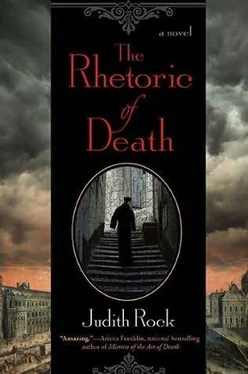Judith Rock - The Rhetoric of Death
Здесь есть возможность читать онлайн «Judith Rock - The Rhetoric of Death» весь текст электронной книги совершенно бесплатно (целиком полную версию без сокращений). В некоторых случаях можно слушать аудио, скачать через торрент в формате fb2 и присутствует краткое содержание. Жанр: Исторический детектив, на английском языке. Описание произведения, (предисловие) а так же отзывы посетителей доступны на портале библиотеки ЛибКат.
- Название:The Rhetoric of Death
- Автор:
- Жанр:
- Год:неизвестен
- ISBN:нет данных
- Рейтинг книги:3 / 5. Голосов: 1
-
Избранное:Добавить в избранное
- Отзывы:
-
Ваша оценка:
- 60
- 1
- 2
- 3
- 4
- 5
The Rhetoric of Death: краткое содержание, описание и аннотация
Предлагаем к чтению аннотацию, описание, краткое содержание или предисловие (зависит от того, что написал сам автор книги «The Rhetoric of Death»). Если вы не нашли необходимую информацию о книге — напишите в комментариях, мы постараемся отыскать её.
The Rhetoric of Death — читать онлайн бесплатно полную книгу (весь текст) целиком
Ниже представлен текст книги, разбитый по страницам. Система сохранения места последней прочитанной страницы, позволяет с удобством читать онлайн бесплатно книгу «The Rhetoric of Death», без необходимости каждый раз заново искать на чём Вы остановились. Поставьте закладку, и сможете в любой момент перейти на страницу, на которой закончили чтение.
Интервал:
Закладка:
“I am here,” she said simply. “David is gone, I am not breaking any vow.”
“But I would be.”
“Not a final vow.”
“That’s hair splitting.”
“Well, that thing Jesuits do-casuistry, isn’t it called? Don’t you teach that the end justifies the means?”
“It’s much more complicated than that.” Suddenly he was laughing. And thinking that any man who thought body and mind had no commerce had never loved a brilliant woman. “Is it the custom among Huguenots to discuss theology when considering-um-?”
“Considering bedding together? It has been known,” she said gravely, but he could hear her smile even though he couldn’t see it. “But it is not required.”
“What is the end the means might justify, Pernelle?”
“Whole-heartedness.”
“Whose?”
“Ours. But especially yours.”
“Expound, my learned maitresse,” he said laughing softly.
“We loved each other, Charles. We meant to marry. When they pulled us apart, I thought I would die. But I learned to love David and he loved me. My heart grew into one whole piece again. But I think yours has not been able to. You need a whole heart to give to God.” She put her hand on his cheek and a small yearning sound escaped her. “Make love with me, Charles. For both our sakes. If we go through this last door together, then perhaps we can go on apart.”
Her fingers fumbling at his neck to untie his shirt stirred him into fire. He rose to his feet, untied the cloak she wore, and pushed her shirt-his shirt-off her shoulders. He held her against his naked chest, his face buried in her hair, and felt like every lost creature who has ever found its home again. The Silence, or the air around him, or maybe just he himself, released a long-held breath.
Hours later, when he woke, it was deep night and rain was blowing against the window. For a moment, he thought he was a boy at home again and his brother was taking up most of the bed. Then his heart nearly burst with thankfulness as he realized that the knees in his back and the arm across his waist were Pernelle’s. He wriggled closer to her, and she stirred and kissed his spine.
“Good morning,” he said.
“Not morning yet, but very, very good!”
He rolled onto his back, hardly feeling his wound, and pulled her on top of him. “My joy, my heart, my love.” He was nearly singing. “Thank you. For your wisdom, for your great gift. I kneel at your feet, I-”
Laughing, she covered his mouth with hers and then pulled away. “That’s all very pretty, but get to business, sir.”
So he did.
When he woke again she was sleeping soundly. Her head was on his chest and he breathed in the sweet scent of her hair. He hoped he hadn’t been repulsive, still wearing his day’s sweat. But she hadn’t seemed repulsed. His smile was broad enough to light the dark. But dawn was coming. His arm tightened around her. Before dawn, she would go. He tensed against grief’s assault, but it didn’t come. But I love her with all my heart, he said to the Silence, appalled at his lack of feeling.
Yes, Something said very distinctly in the dark. Charles froze, feeling like Adam discovered with Eve after they’d shared the apple, and everything else. Pernelle sighed in her sleep and put a warm hand over his heart. Light too bright to look at seemed to come from nowhere and flood everything, every smallest piece of him. And he finally understood, though he also didn’t understand at all. She would go and he would love her. And he would love many other things, though not any other woman. Yes, the Silence said.
Darkness still held Paris in its arms when Charles and Pernelle went hand in hand to the street passage. The college was sleeping and the porter hadn’t yet come to his post. Pernelle was in her boy’s clothes, wearing her cloak and with the last of the rector’s pouch of coins in her pocket. Before they reached the postern, the bell rang beside it. They stopped and turned to each other. Charles put down his lantern.
“Go with God, beloved heart,” he whispered, and kissed her. “Always.”
Her dark eyes were silvery with tears. “Always.”
Charles unbarred the postern door and Lieutenant-General La Reynie, booted and cloaked, stepped out of the darkness.
“Quickly,” he whispered.
Pernelle’s hand rested briefly against Charles’s heart. Then she turned to La Reynie and Charles closed and rebarred the door. He listened to the two pairs of feet walk toward the river and when he could no longer hear them, he went to the chapel. He meant to go to the Virgin’s altar, but he found himself instead standing in front of the statue of Jeanne d’Arc, the Maid of Orleans. He knelt where he and Pernelle had knelt just a few days before, and waited for the blow of her leaving to hit him. Instead, an emptiness grew inside him. Not a grieving emptiness. A waiting emptiness, he thought, gazing uneasily up at the Maid. She stared over his head, as though she were waiting, too, waiting for the English army and knowing, against all the odds, that she would prevail.
“But they killed you,” Charles said out loud. The statue calmly studied the horizon. “They burned you,” he said. But only after she had saved France. His breath began to come short. “I have no power,” he protested, “no power at all!” But neither had she, only belief in her truth. They could take her mortal life-and they had-but God had held her soul’s life. So she had clung to nothing but God; her enemies had had nothing she wanted. She’d had no price. That was her power. Charles stood up. Or something pulled him upright.
Chapter 38
The servant who opened the Hotel de Louvois’s gate was as brusque as the war minister himself. He waved Charles across the cobbles to the house door and disappeared into one of the ground-floor outbuildings. Charles picked up the iron fist that served as a knocker and let it fall.
“I am Maitre Charles Matthieu Beuvron du Luc,” he said to the surly footman who answered, putting several generations of Provencal noblemen into his voice. “Please tell M. Louvois that I must speak with him. About last night’s events at the college of Louis le Grand.”
“Wait here.”
He waited in an antechamber done in rich red, listening to the early-morning stirrings of the household. The footman returned as quickly as Charles thought he would and led him upstairs to a large room whose glowing parquet was an expanse of eight-pointed golden stars. Across the room, in front of long windows, Louvois sat writing behind a massive black desk. Ebony, Charles thought. The room was so padded and plump with luxury that Louvois’s plum brocade house robe and turbanlike head wrapping made him seem like just one more piece of costly decor.
“Monsieur.” Charles nodded to him slightly.
Louvois glanced up. “What do you want? It is barely day.”
“You will have heard, I think, in spite of the hour, of last night’s deaths at the college.”
“Of course,” Louvois said, still writing. “It is all over Paris. Pere Guise was my confessor,” he added accusingly, as though Charles were disturbing his mourning.
“Before Pere Guise and Frere Moulin died, they talked.”
Louvois’s hands stilled. “I did not know this Moulin.”
“On the contrary, Monsieur Louvois. Last night Frere Moulin talked much about his usefulness to you. As your errand boy for the dragonnades you and Pere Guise have run these last years. I know the king knows about them. I know he wants them to go on. I also know that if they are forced publicly on his notice, you will be the scapegoat. He will accuse you of usurping his authority and you will likely die a very public traitor’s death to save his face.”
“The man who forces such knowledge on Louis will also die,” Louvois said, purple with fury. “He will see to that, make no mistake.”
Читать дальшеИнтервал:
Закладка:
Похожие книги на «The Rhetoric of Death»
Представляем Вашему вниманию похожие книги на «The Rhetoric of Death» списком для выбора. Мы отобрали схожую по названию и смыслу литературу в надежде предоставить читателям больше вариантов отыскать новые, интересные, ещё непрочитанные произведения.
Обсуждение, отзывы о книге «The Rhetoric of Death» и просто собственные мнения читателей. Оставьте ваши комментарии, напишите, что Вы думаете о произведении, его смысле или главных героях. Укажите что конкретно понравилось, а что нет, и почему Вы так считаете.












